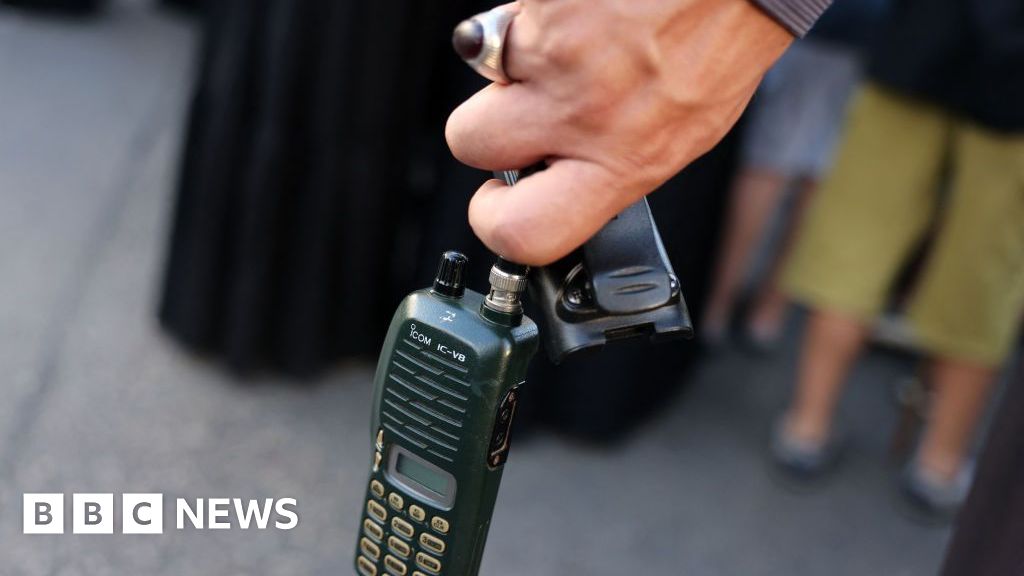A Japanese handheld radio manufacturer has distanced itself from walkie-talkies bearing its logo that exploded in Lebanon, saying it discontinued production of the devices a decade ago.
At least 20 people were killed and 450 injured after hundreds of walkie-talkies, some used by the armed group Hezbollah, exploded across Lebanon on Wednesday.
The devices, according to photos and video of the aftermath of the attack, appear to be IC-V82 transceivers made by Icom, an Osaka-based telecommunications manufacturer.
But Icom says it hasn’t produced or exported IC-V82s, nor the batteries needed to operate them, for 10 years.
It is the second Asian company to be embroiled in bombing incidents in Lebanon this week, after thousands of exploding pagers seemingly linked to Taiwanese firm Gold Apollo killed at least 12 people and injured more than 2,000.
Gold Apollo’s founder Hsu Ching-Kuang flatly denied his company had anything to do with the attacks, saying he licensed his trade mark to a company in Hungary called BAC Consulting, whom the BBC has been unable to contact.
Icom told the BBC it was aware of reports that two-way radio devices bearing its logo had exploded in Lebanon, and said it was investigating the matter.
“The IC-V82 is a handheld radio that was produced and exported, including to the Middle East, from 2004 to October 2014. It was discontinued about 10 years ago, and since then, it has not been shipped from our company,” Icom said in a statement.
“The production of the batteries needed to operate the main unit has also been discontinued, and a hologram seal to distinguish counterfeit products was not attached, so it is not possible to confirm whether the product shipped from our company.”
Icom further added that all its radios are manufactured at the same factory in Japan, and that it only sells products for overseas markets via authorised distributors.
Earlier, a sales executive at the US subsidiary of Icom told The Associated Press news agency that the exploded radio devices in Lebanon appeared to be knockoff products that were not made the company – adding that it was easy to find counterfeit versions online.
The device is favoured by amateur radio operators and for use in social or emergency communications, including by people tracking tornadoes or hurricanes, he said.
It took the BBC a matter of seconds to find Icom IC-V82s listed for sale in online marketplaces.
It is unclear at which point in the supply chain these devices were compromised and how. It is also unclear if some of them were merely old Icom IC-V82s, or counterfeits as Mr Novak claimed.
Lebanon’s Annahar newspaper on Wednesday said the Icom walkie-talkies were old handsets.
Reports suggest the walkie-talkies that exploded were purchased by Hezbollah five months ago, according to a security source speaking to Reuters news agency.
Icom produces walkie-talkies and radio devices for marine, aviation and land users, and considers itself a “world leader in the amateur radio market”, according to its website.
Asia is considered a global hub for telecoms and electronics, with countries like Japan, Taiwan and China being home to major tech producers that are often favoured as a benchmark of quality.
BBC Verify investigated BAC Consulting, the company linked to the pagers involved in Tuesday’s explosions, and found that the firm has a single shareholder and is registered to a building in the Hungarian capital Budapest’s 14th district.
As well as BAC, a further 13 companies and one person are registered at the same building. BBC Verify’s search of a financial information database, however, does not reveal that BAC has any connections to other companies or people.
Its CEO Cristiana Bársony-Arcidiacono said she knew nothing about the explosions. “I don’t make the pagers. I am just the intermediate. I think you got it wrong,” she told NBC.

